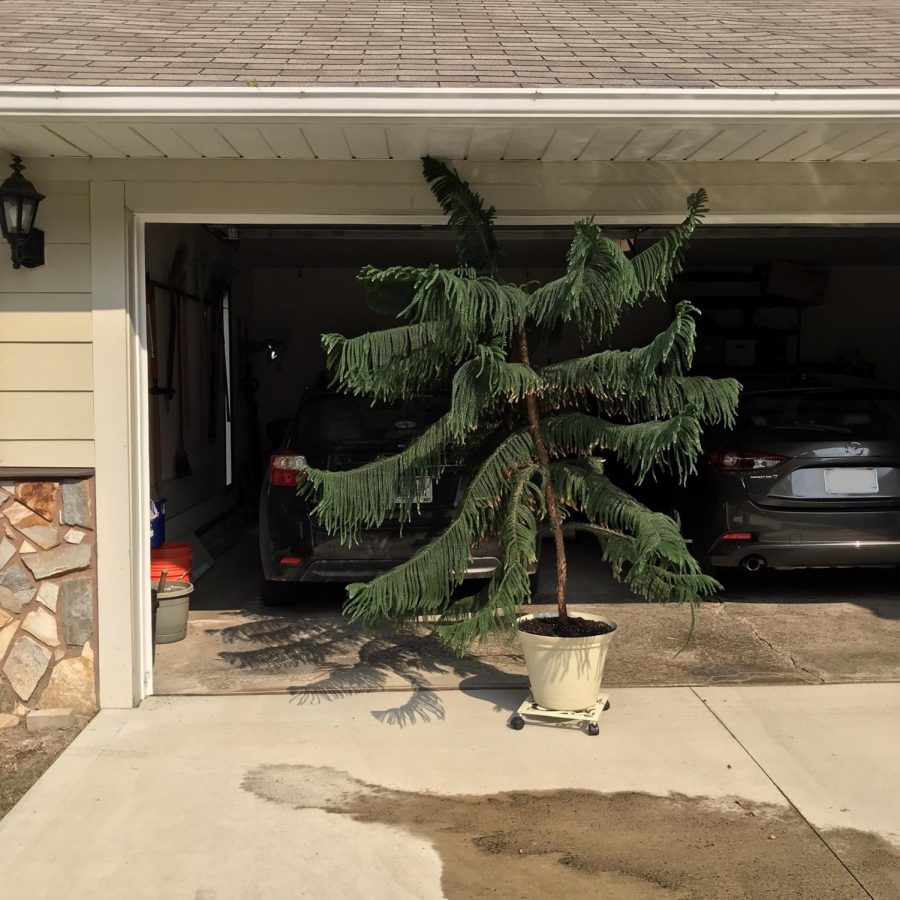Oberlin Facebook Group Connects Residents to Resources, Each Other
Oberlin resident Josie Gruber used the “What do you have? What do you need?” group to find this beautiful Norfolk pine. She also then used the group to pass the plant along to someone else, upon realizing it was too big for her space.
As any longtime resident will know, the people of Oberlin are always looking for a way to help each other out, and not even a global pandemic could get in the way of that. In a creative solution to some of the challenges of COVID 19, Oberlin residents came together online in the Facebook group “Oberlin – What do you have? What do you need?”. In it, they have created a new space for taking care of one another as a community.
Oberlin resident Ellis Hartman has used the group on a number of occasions. He has given things away, received items, and requested help identifying bird calls — although he notes that this last effort was the least successful, as Oberlin has many different kinds of birds.
“I probably wouldn’t have discovered it [if not] for the pandemic because now, like a lot of people, I spend more time on Facebook,” Hartman said. “I just liked the fact that they’re helpful things. It’s something interesting to do while I [am] on Facebook.”
The group also serves as a de facto replacement for the Oberlin Classifieds website, which shut down earlier this year because the platform could no longer support modern internet security software.
“I used to go on the Oberlin College website to look at [Oberlin Classifieds], and I’ve heard that that doesn’t exist anymore,” Hartman said. “This was a great substitute for that.”
Amongst the many needs that Oberlin Classifieds used to fill, both for students and community members, the page acted as a universal platform to help people search for housing. Longtime Oberlin resident and local landlord Amy Burgess emphasized how important Classifieds had been when it came to helping people locate housing in Oberlin.
“Classifieds is where we got about 90 percent of our tenants in the past,” Burgess said. “I wish that something like Classifieds still existed because not everyone’s on social media or not everyone chooses to use Facebook. But I’m glad that the group exists, and it’s been a big help.”
Part of what makes the Facebook group so exciting is its capacity to create a common space for city residents. Members of the town community, College professors, and Oberlin students can all share with each other, non-hierarchically. It’s almost impossible to distinguish between town and gown without looking at profiles.
“I know mostly people from the College, but [in the group] there’s no awareness of who’s a professor, who’s a local person,” said the group’s founder, Frieda Fuchs. “I actually liked that it’s anonymous in that respect because those divisions exist and they’re there, but I wanted it to be a place where everyone’s welcome and it’s not one group against another group.”
Fuchs is a former research affiliate and visiting professor in the Politics department in the College, specializing in child labor laws and labor legislation in Europe. She founded the group at the beginning of the pandemic in March, in response to a perceived need by the community for connection. She was inspired by another Facebook group in Rochester, NY with a similar name. The Oberlin group grew quickly and its structure has shifted, but its goal has stayed the same. Fuchs’ vision for it has always been to provide a platform for people to reach out and help their neighbors.
“With the Trump administration, basically everything’s been delegated to the states and to the localities,” Fuchs said. “You can feel sort of powerless because you really feel the need for the government to step in… Given that that’s not happening, I think that it’s more important than ever for us to come together at the local level. This is one way, I think, in which it can be done. I’m not really quite sure what other groups have formed in other parts of the [country], but at least here in Oberlin, I think this is sort of a way of empowering us at the local level.”
Fuchs also made it clear that she wanted anyone, regardless of their political affiliation, to be comfortable being involved in the group and giving or receiving support. While the group has expanded beyond her original intention, she and her co-moderator Jill Mason Blake have been very intentional in making sure that discussion stays civil and as far from politics as possible.
“I just wanted it to be an apolitical group,” said Fuchs. “I felt that if politics is dividing us so much, then let’s try to transcend that and try to figure out other ways in which we can just get together as citizens.”
While the pandemic has kept many people apart, some things unite us all: caring for our communities, the need for human connection, and the search for an Instant Pot.











